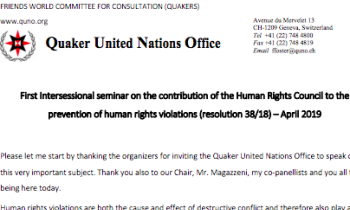QUNO speaks during the first Intersessional seminar on the contribution of the HRC to the prevention of human rights violations

In April, QUNO's Florence Foster was invited to speak during the first Intersessional seminar on the contribution of the Human Rights Council to the prevention of human rights violations (resolution 38/18). Florence noted that human rights violations are both the cause and effect of destructive conflict, and they therefore play a central role in early warning, prevention of destructive conflict, and in providing the basis for accountability through to rebuilding societies.
For the past several years, QUNO's Peace and Disarmament programme, has worked to explore how human rights generally, and the UN human rights mechanisms, are central throughout the peace/conflict continuum. In her remarks, Florence highlighted how the UN's Universal Periodic Review (UPR) process in particular could contribute to prevention and to sustaining peace more broadly. Her observations were twofold:
- The UPR, as a process, could in and of itself be a facilitator of open dialogue and understanding, a key feature of peacebuilding.
- The UPR, as a platform for inclusive context analysis through the universality of themes it covers, could lend itself to bridging between human rights and sustaining peace.
In order to move forward towards better leveraging the UPR’s prevention potential, QUNO recommended the following:
- OHCHR and UPR info should increase participation of peacebuilding and social cohesion actors throughout their Standard operating Procedures when supporting civil society, UN as well as Governmental preparatory and implementation processes – this would enable compilations, recommendations and implementation activities to have a prevention lens.
- OHCHR should make a similar explicit mention of this inclusive participation in the directives sent out to state officials, UN Country Teams and Resident Coordinators.
- UN and Member States counterparts from the in the development and peace & security spheres in New York should be made aware of the UPR and its value added to prevention across the system.
- Recommending States should reach across the Atlantic and to their in-country representation systematically throughout the UPR Cycle to bridge silos and enable a holistic approach that draws on conflict analysis and peacebuilding practices to sustain peace.
- Throughout the system, actors should leverage the moments the UPR offers for exchange AND use the information in the UPR compilations for early warning of risks of violent conflict across the system.
The Peacebuilding Commission could for instance create a space for informal discussions, using the country cycles of the UPR and leverage that opportunity to further their own analysis and processes, and explore how the peace and security pillar could support in the implementation of certain recommendations. The Caucus group of member states could also facilitate more of these discussions in both Geneva and New York.
The full text of Florence's remarks are available in the file below.


